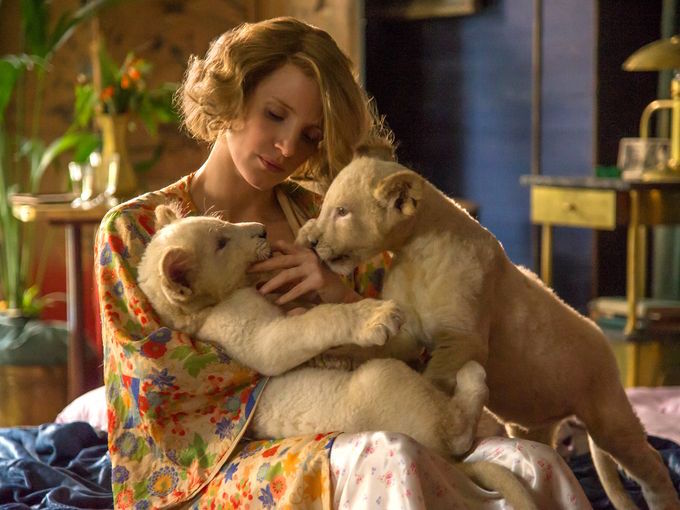 THE ZOOKEEPER’S WIFE (2017); Dir. Niki Caro; Starring Jessica Chastain, Daniel Bruhl, Johan Heldenbergh; Trailer here.
THE ZOOKEEPER’S WIFE (2017); Dir. Niki Caro; Starring Jessica Chastain, Daniel Bruhl, Johan Heldenbergh; Trailer here.
By Andrew Kemp
Contributing Writer
Before the Atlanta Film Festival screening of THE ZOOKEEPER’S WIFE, an introduction promised the audience that this film was not going to be “just another Holocaust film.” Although it seems callous to think that films about the signature human rights catastrophe of the 20th century could ever be boring, it would be accurate to say that, over the years, a particular set of tropes has taken root when portraying the event on the screen. The situation will look bad; some will say that it will pass; the noose will tighten; and then comes the iconography of the horror—trains, camps, ash. Inevitably, choices must be made about who to help, and how. Sometimes the films end on a down note, sometimes on an up note. But no ending can ever accurately be called “happy.”
I’m sorry to say that, despite that hopeful introduction, THE ZOOKEEPER’S WIFE doesn’t quite escape these expectations. Apart from a few key flourishes, the film follows the pattern mostly down the line. To garble a famous phrase, the people who don’t like this kind of thing will find this the kind of thing they don’t like.
Jessica Chastain plays the title character, Antonina Zabinski, principal animal caretaker at the Warsaw Zoo and wife to stoic Jan (Heldenbergh). We follow Antonina on an idyllic day through the zoo, which is presented as a utopian free-range menagerie where visitors can run alongside a camel or frolic with a set of baby lion cubs. Of course, this scene takes place in 1939, and within short order the German invasion has begun. The zoo is hit particularly hard—the animals are “liquidated” for soap and meat (mostly off-screen, with some startling exceptions—be warned), and the Germans place a permanent munitions garrison on the site. But the Zabinskis are concerned when a Jewish friend is forced to relocate into the Warsaw ghetto, and they decide to hide his wife, at great personal risk (“You can be shot for giving them a cup of water,” Jan reminds Antonina).
The situation is complicated by the presence of Lutz Heck (Bruhl), Hitler’s top zoologist who hopes to breed an extinct auroch from the Zabinski’s oxen. Heck has designs on Antonina, who spends most of her time at the zoo alone as Jan involves himself into the Warsaw resistance, helping as many as he can flee the ghetto to safety. As the war goes on, and as the tunnels beneath the Zabinski house fill with hidden Jews, it becomes harder, but ever more critical, to keep Heck from discovering their secret.
The film’s stakes are certainly high, and the drama is reasonably intense. But director Niki Caro [WHALE RIDER (2002)] fails to give the film the kind of visual tension it deserves. At its weakest moments, the film appears like one of the more inert of the Merchant-Ivory films, nicely decorated but somehow flat, with the performers stuck pantomiming rote material in a dollhouse. For example, as Jan becomes aware of Heck’s flirtations, he becomes bafflingly infuriated with Antonina. Surely he understands her need to keep the German distracted while on their property? And yet he seems to be angry simply because there’s not enough conflict in the second act, and the film still has the rest of the war to wait out.

Jessica Chastain stars as Antonina Zabinski in director Niki Caro’s THE ZOOKEEPER’S WIFE, a Focus Features release. Credit: Anne Marie Fox / Focus Features
The star attraction should be the movie star Chastain, but she plays Antonina with a demure squeak of a voice that befits the muted passions of the movie she’s in. If there is any element to distinguish the film (beyond the costuming and production design, which are lovely), it’s the way in which the story is shifted to Antonina from her more traditionally heroic husband. While Jan is crossing into the ghetto, rescuing abused children, and taking up arms in an open fight, the film posits that Antonina’s role in protecting her family and the all-important hiding place is worth every bit the heroic acclaim. The film attempts to identify a female perspective on the life in occupied Warsaw, where Nazism is inextricably intertwined with toxic masculinity. The Germans don’t simply kill their victims, they displace and starve and rape them, dominating non-German bodies as outbursts of masculine bravado. If there’s a second element to distinguish the film, it’s that it seems eerily uncomfortable when compared to the modern mood in some of the more unsavory—but increasingly visible—corners of our national conversation.
Ultimately THE ZOOKEER’S WIFE is another holocaust movie. Your interest in that promise may vary, but let us be clear that the world, the trajectory, and the situations in the film are nakedly (and all too uncomfortably) familiar.
THE ZOOKEEPER’S WIFE screened this week at the Atlanta Film Festival on march 29. For more information, check out the official site.
